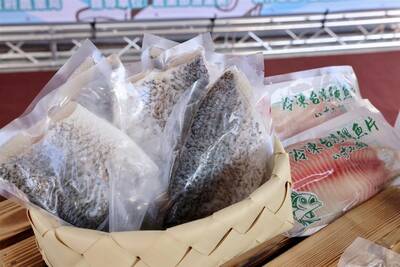Chinese Nationalist Party (KMT) Vice Chairman Andrew Hsia (夏立言) yesterday departed for China, where he is expected to meet with Chinese officials amid heightened tensions with Beijing.
Hsia’s nine-day trip, which is expected to include a meeting with China’s new Taiwan Affairs Office Director Song Tao (宋濤), has drawn criticism from the Democratic Progressive Party (DPP), but received support from Beijing.
Taiwan Affairs Office spokeswoman Zhu Fenglian (朱鳳蓮) said that China welcomed Hsia’s visit, adding that Beijing is “willing to strengthen exchanges with the nationalists, consolidate and enhance mutual trust, and deepen exchanges and cooperation in various fields on the common political foundation of adhering to the 1992 consensus and opposing Taiwan independence.”

Photo: Ann Wang, Reuters
She said that the DPP was acting “out of selfish political interest” in seeking independence with foreign support.
The so-called “1992 consensus,” a term former Mainland Affairs Council chairman Su Chi (蘇起) in 2006 admitted making up in 2000, refers to a tacit understanding between the KMT and the Chinese government that both sides of the Taiwan Strait acknowledge there is “one China,” with each having its own interpretation of what “China” means.
Hsia visited China in August last year, six days after Beijing launched a high-pressure military and economic campaign against Taiwan following a visit by then-US House of Representatives speaker Nancy Pelosi.
His visit this week follows several recent high-profile delegations by foreign lawmakers to Taiwan, and after US House of Representatives Speaker Kevin McCarthy pledged to visit Taipei.
Those actions “damage the Taiwan compatriots’ interests and well-being, endangers their safety and security, and gradually push Taiwan to a dangerous stage,” Zhu said, in a reference to China’s threat to use force to annex Taiwan.
Speaking to reporters at Taiwan Taoyuan International Airport yesterday, Hsia called the trip “apolitical,” and aimed at helping Taiwanese living and working in China.
Regarding the timing of this visit and his trip last year, he said that “for some people, there will never be a good time to visit China,” adding that “the more perilous the situation, the more reason for a visit.”
Hsia’s delegation includes KMT Mainland Affairs Department head Lin Chu-chia (林祖嘉), and Kao Su-po (高思博) and Chao Chun-shan (趙春山) of the National Policy Foundation, a KMT-affiliated think tank.
They are to visit Shanghai, Nanjing, Wuhan, Chongqing and Chengdu during the trip, which ends on Friday next week.
He said he hoped the group could help resolve issues affecting Taiwanese small and medium-sized enterprises, particularly in the agricultural and fisheries sectors, hit by a series of import suspensions rolled out by China since 2021.
He said that relations between Taipei and Beijing had warmed following Taiwan’s lifting of border controls in October last year, adding that he hoped the trip would further improve understanding and dialogue across the Strait.
This would be consistent with the hopes of President Tsai Ing-wen (蔡英文), who has asked Taiwanese businesspeople in China to engage in “positive interactions and dialogue” with Chinese, he said.
Regarding whether he would express concern to Chinese officials over CIA Director William Burns’ remarks last week that Chinese President Xi Jinping (習近平) had ordered the military to be ready invade Taiwan by 2027, Hsia said that “the timeline for such an invasion varies from one source to another, but any issue that is of concern for Taiwanese would be brought up with the other side at appropriate times.”

Taiwan's Vice President Hsiao Bi-khim (蕭美琴) said Saturday that she would not be intimidated by the Chinese Communist Party (CCP), following reports that Chinese agents planned to ram her car during a visit to the Czech Republic last year. "I had a great visit to Prague & thank the Czech authorities for their hospitality & ensuring my safety," Hsiao said on social media platform X. "The CCP's unlawful activities will NOT intimidate me from voicing Taiwan's interests in the international community," she wrote. Hsiao visited the Czech Republic on March 18 last year as vice president-elect and met with Czech Senate leadership, including

There have been clear signs of Chinese Communist Party (CCP) attempts to interfere in the nationwide recall vote on July 26 in support of Chinese Nationalist Party (KMT) legislators facing recall, an unnamed government official said, warning about possible further actions. The CCP is actively involved in Taiwanese politics, and interference in the recall vote is to be expected, with multiple Chinese state media and TAO attempts to discredit the Democratic Progressive Party (DPP) and undermine public support of their recall movement, the official said. This interference includes a smear campaign initiated this month by a pro-Beijing Hong Kong news outlet against

A week-long exhibition on modern Tibetan history and the Dalai Lama’s global advocacy opened yesterday in Taipei, featuring quotes and artworks highlighting human rights and China’s ongoing repression of Tibetans, Hong Kongers and Uighurs. The exhibition, the first organized by the Human Rights Network for Tibet and Taiwan (HRNTT), is titled “From the Snowy Ridges to the Ocean of Wisdom.” “It would be impossible for Tibetans inside Tibet to hold an exhibition like this — we can do it. because we live in a free and democratic country,” HRNTT secretary-general Tashi Tsering said. Tashi Tsering, a Taiwan-based Tibetan who has never

A first shipment of five tons of Taiwan tilapia was sent from Tainan to Singapore on Wednesday, following an order valued at NT$600,000 (US$20,500) placed with a company in the city. The products, including frozen whole fish and pre- cooked fish belly, were dispatched from Jiangjun Fishing Harbor, where a new aquatic processing and logistics center is under construction. At the launch, Tainan Mayor Huang Wei-che (黃偉哲) called the move a “breakthrough,” marking Taiwan’s expansion into the Singaporean tilapia market. Taiwan’s tilapia exports have traditionally focused on the United States, Canada, and the Middle East, Huang said, adding that the new foothold in